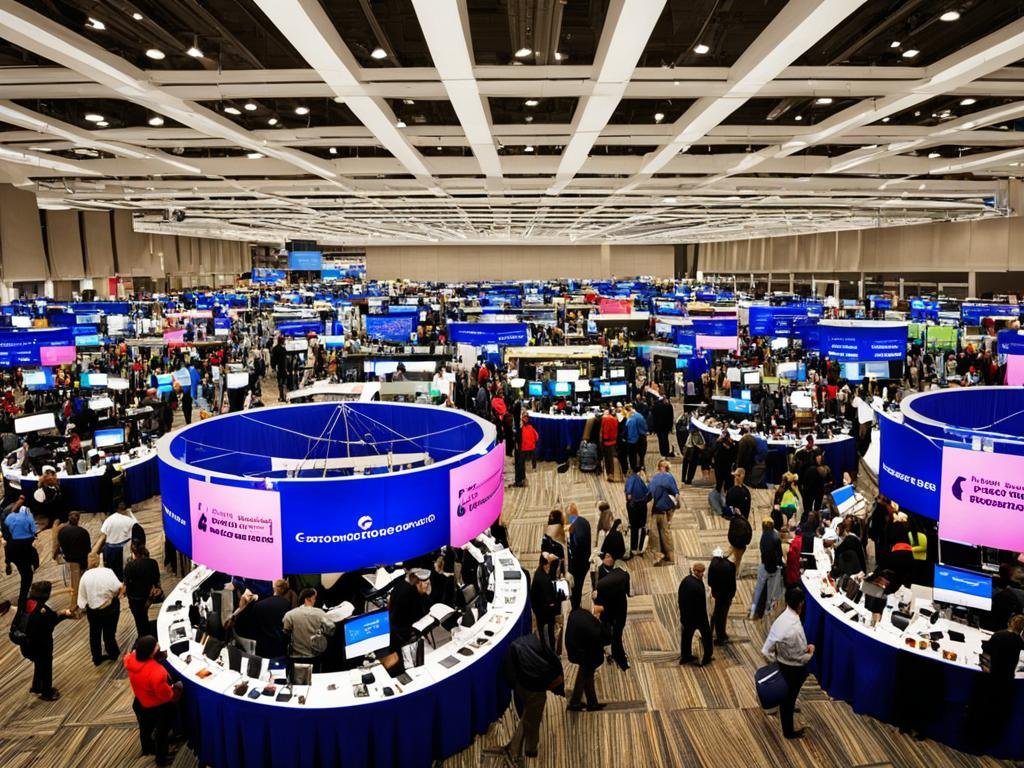A skilled technical recruiter can make all the difference in finding and securing top tech talent for an organization. The expertise of a technical recruiter in talent acquisition is essential to navigating the complex and competitive landscape of the tech industry. As a hiring manager, partnering with a knowledgeable technical recruiter is critical to building a successful team of skilled and talented professionals.
In this article, we will delve into the role of a technical recruiter, their responsibilities and duties, and the strategies they use to source, screen and select candidates. We’ll also discuss how technical recruiters collaborate with hiring managers, the importance of soft skills, and leveraging technology for efficient recruitment.
Key Takeaways
- A technical recruiter’s expertise in talent acquisition is essential in securing top talent for technical positions.
- The role of a technical recruiter involves collaborating with hiring managers, sourcing candidates, screening and selecting the best candidates, and crafting effective job descriptions.
- Effective communication skills and attention to detail are crucial soft skills for technical recruiters in evaluating candidates’ fit for specific roles.
- Technology, such as applicant tracking systems, job boards, and recruitment software, can enhance the recruitment process for technical recruiters.
- A degree in human resources or related fields can be valuable for those interested in pursuing a career in technical recruiting.
The Role of a Technical Recruiter
Technical recruiters are recruitment specialists responsible for talent acquisition in technical positions. They work closely with hiring managers to identify job vacancies and fill them with top talent. Their primary responsibility is to source and screen potential candidates for technical positions, leveraging various recruitment strategies to find the best fit for each role.
As recruitment specialists, technical recruiters are experts in the various technologies and skill sets required for each position they are recruiting for. They collaborate with hiring managers to craft job descriptions that detail the necessary skills and qualifications required for the role.
Technical recruiters use various channels for candidate sourcing, from online job boards and social media platforms to partnerships with employment agencies. They build relationships with potential candidates to foster a positive candidate experience and increase the likelihood of successful placements.
As part of their responsibilities, technical recruiters also conduct candidate screening and selection processes, reviewing resumes and conducting interviews to assess candidates’ technical abilities, communication skills, and fit for the organization.
The role also requires technical recruiters to have excellent communication skills, as they must engage in ongoing communication with hiring managers and potential candidates throughout the recruitment process. This communication includes providing feedback and updates on the status of open positions and conducting reference checks for selected candidates.
Talent acquisition is a crucial aspect of an organization’s success, and technical recruiters play a vital role in this process. By sourcing, screening, and selecting top tech talent, they ensure that an organization is staffed with skilled and knowledgeable professionals to help drive growth and success.
Effective Sourcing Strategies
One of the fundamental responsibilities of technical recruiters is to source qualified candidates for technical positions. Effective candidate sourcing requires recruiters to utilize various strategies and techniques to attract top talent. Here are some of the most common sourcing strategies:
Online Platforms and Social Media Networks
Recruiters can leverage online platforms such as LinkedIn, GitHub, and Stack Overflow, as well as social media networks like Twitter and Facebook, to find potential candidates. They can search for candidates with specific technical skills, expertise, and experience by using keywords and filters. Additionally, recruiters can use social media to showcase their organization’s culture and job openings to a broader pool of potential candidates.
Employment Agencies
Partnering with employment agencies can be an effective sourcing strategy for technical recruiters. Employment agencies often have an extensive network of candidates with specific technical skills and experience. Recruiters can work with these agencies to connect with qualified candidates who may not be actively seeking new job opportunities.

Referrals and Networking
Referrals from current employees and networking with industry professionals can also be a valuable sourcing strategy for technical recruiters. Referrals from employees can result in high-quality candidates who are a good fit for the organization’s culture. Networking with industry professionals can help recruiters establish relationships with top technical talent.
Job Boards
Posting job openings on relevant job boards can be an effective way to attract potential candidates. Job boards such as Dice, Indeed, and Glassdoor allow recruiters to post technical job openings and reach a broader audience of potential candidates. It’s important for recruiters to tailor job postings to the specific technical roles they’re recruiting for and include essential technical knowledge requirements.
Screening and Selecting Candidates
Technical recruiters play a critical role in finding the best candidates for technical positions. To ensure they select the most qualified prospects, recruiters employ a thorough and rigorous candidate screening process that evaluates candidates’ technical skills, experience, and fit for the role.
Before beginning the interview process, technical recruiters review resumes to ensure candidates meet the job’s essential requirements. Once the recruiters have identified the most qualified applicants, they schedule interviews to further evaluate their skills and qualifications.
During the interview process, technical recruiters assess candidates’ technical knowledge and skills. Effective communication skills are essential to determine the candidate’s fit for a specific role. Consequently, recruiters gauge the candidate’s responses to evaluate how well they can communicate complex technical information.
Ultimately, technical recruiters must select the most qualified candidate for the position. By thoroughly vetting applicants and assessing their technical skills, experience, and communication abilities, technical recruiters help organizations secure top technical talent.

Crafting Effective Job Descriptions
Writing a captivating job description is crucial for technical recruiters aiming to attract top talent for their organization’s technical positions. An effective job description should provide insights into the responsibilities and expectations of the role.
When crafting job descriptions, technical recruiters should pay close attention to the specific requirements of the role. Utilizing a technical recruiter job description template can ensure important details are not overlooked. These templates also allow recruiters to tailor descriptions to specific technical roles in order to attract the best candidates.
Key elements of an effective job description include:
- Job Title: Clearly communicate the job title to attract the right candidates.
- Job Summary: Highlight the essential functions of the role and what the job entails.
- Responsibilities: List the main duties expected of the role.
- Requirements: Include relevant education, certifications, experience, and specific technical skills required for the position.
- Working Conditions: Mention any physical and/or environmental conditions associated with the role, such as working with hazardous material or in extreme temperatures.

Including essential technical knowledge requirements in job descriptions is crucial for technical roles. It helps attract qualified candidates and ensures their technical skills and knowledge align with the role’s requirements. Additionally, clear and concise job descriptions can streamline the recruitment process by reducing the number of non-relevant applications.
“A clear and detailed job description is the first step in attracting top talent. It is crucial to take the time to research and understand what candidates are searching for in job postings to craft the most effective descriptions possible.” – Jane Smith, Technical Recruiter
Collaborating with Hiring Managers
Technical recruiters must prioritize building strong relationships with hiring managers to ensure open positions are filled with the best candidates. Collaboration between the two is key to understanding the specific needs and requirements of the positions within the organization. Recruiters must actively engage with hiring managers to determine the important technical skills necessary for success in each role.
It is essential to keep communication channels open, providing feedback and updates on the progress of the hiring process. Gathering feedback from hiring managers on candidates’ interviews helps recruiters to refine their candidate selection process and improve hiring success rates.

Establishing trust and open communication with hiring managers can also help match the candidates with the right job openings. In some cases, the hiring manager has limited knowledge of the technical skillset required for a role, but the technical recruiter can fill in the gaps and provide valuable insight.
Benefits of Collaborating with Hiring Managers
| Benefits for Recruiters | Benefits for Hiring Managers |
|---|---|
| Improves understanding of open positions’ technical requirements | Helps hiring managers match specific job roles with the right candidates |
| Refines candidate selection process | Reduces time taken to find qualified candidates |
| Facilitates open communication and feedback | Ensures the hiring process is consistent and reliable |
Collaboration between technical recruiters and hiring managers is essential in finding the best candidates for specialized tech roles and in promoting understanding and appreciating the specific needs and preferences of job positions. Engaging in effective collaboration enhances the hiring process, speeds up the hiring process, and helps recruiters and organizations attract and retain top talent.
Tapping into Job Fairs and Recruitment Events

Job fairs and recruitment events are valuable opportunities for technical recruiters to network and connect with potential candidates. These events offer access to a diverse pool of candidates, including fresh graduates and experienced professionals seeking employment. Moreover, job fairs and recruitment events allow recruiters to showcase their organization’s culture and job openings, thus attracting passive job seekers.
The Benefits of Job Fairs for Technical Recruiters
One significant advantage of job fairs is that they provide recruiters with the chance to meet with a large number of potential candidates in a short amount of time. At these events, recruiters can collect resumes, conduct initial screenings, and discuss available job opportunities.
Furthermore, job fairs provide recruiters with an opportunity to network with other professionals in their industry. This enables them to learn more about industry trends and best practices while building valuable connections that can help them source candidates in the future.
Showcasing Your Organization’s Brand
Job fairs also provide recruiters with the opportunity to showcase their organization’s culture and job openings to potential candidates. By having a booth that’s well-designed, visually appealing, and staffed by knowledgeable recruiters, job seekers can get a sense of what it’s like to work for your organization.
Recruiters can also use job fairs to collect job seekers’ resumes and contact information, enabling them to follow up with candidates who may be a good fit for open positions in the future.
Effective Networking at Recruitment Events
Networking is the key to success at recruitment events. Technical recruiters must be proactive in striking up conversations with job seekers and other professionals. They should also be prepared to talk about their organization’s culture, job openings, and other relevant topics, such as industry trends and best practices.
Recruiters can also attend presentations and workshops at recruitment events to learn more about the latest recruiting techniques and strategies. They can also take the opportunity to meet other recruiters and experts in their field and exchange ideas and insights.
The Importance of Soft Skills in Technical Recruiting
While technical recruiters require a solid understanding of the IT industry and its demands, their success is equally dependent on a set of non-technical competencies. Soft skills are essential characteristics that enable an individual to interact efficiently and amicably with others in a professional setting.
Recruiters must have strong written and verbal communication skills to articulate job descriptions, communicate with candidates, and provide feedback to hiring managers. Additionally, they need to have excellent attention to detail to identify suitable candidates, prepare them for interviews, and evaluate their qualifications. A technical recruiter’s ability to build long-lasting relationships with candidates and hiring managers is also essential in ensuring a smooth and successful hiring process.
Soft skills are essential for technical recruiters to excel in their roles and contribute to their organization’s hiring success.

Leveraging Technology for Efficient Recruitment
Technical recruiting is a highly competitive field and recruitment specialists must take advantage of every tool at their disposal. One way to streamline the recruitment process and improve efficiency is by leveraging technology.
Applicant tracking systems (ATS) are a popular tool used by in-house recruiters to manage job applications efficiently. ATS automates several tasks like sorting resumes, sending acknowledgement emails, and scheduling interviews, freeing up recruiters to focus on high-value activities. Working with job boards like Indeed or LinkedIn is an effective way to broaden reach and attract a larger pool of candidates.
Recruitment software, such as CandidateZip and Textio, help recruiters weed out unqualified candidates and craft better job descriptions. CandidateZip is a resume parser that extracts important information from resumes and online profiles, whereas Textio analyzes job descriptions and predicts the impact of different phrases on the potential candidates.
The benefits of in-house technical recruiters versus outsourcing recruitment is debatable. In-house recruiters are embedded in the company culture, they understand the specific job requirements and often have access to internal referrals. However, outsourcing recruitment to an expert staffing firm can be more cost-effective and lead to a faster hiring process.

Conclusion
In conclusion, technical recruiters play a vital role in recruiting top talent for technical positions. With their expertise in candidate sourcing, screening, and selection, these professionals are essential in building a skilled and diverse workforce. For those interested in pursuing recruiting jobs, a degree in human resources or related fields can be an excellent starting point.
As the demand for technical talent continues to grow, the value of skilled technical recruiters will only increase. Being able to attract top talent is critical to the success of any organization, and technical recruiters are key players in achieving this goal. So, if you have a passion for talent acquisition and a keen eye for top talent, a career as a technical recruiter may be the perfect fit for you.
Thank you for reading and we hope this article has provided valuable insights into the importance of technical recruiters in recruiting top talent for technical positions.
Also Read : Upgrade Skills With Top Technical Writing Courses
FAQ
Q: What are the duties and responsibilities of a technical recruiter?
A: A technical recruiter is responsible for sourcing, screening, and hiring top tech talent for various positions within a company. They also write job descriptions, conduct interviews, negotiate offers, and manage the recruitment process.
Q: What skills are required for a technical recruiter position?
A: Technical recruiters need strong written communication skills, negotiation skills, and the ability to fill technical roles with top talent. They may also require a bachelor’s degree and experience in technical recruitment.
Q: What is the national median salary for technical recruiters?
A: The national median salary for technical recruiters is competitive and varies based on experience, location, and the industry. Experienced technical recruiters may command higher salaries than entry-level positions.
Q: What is the job description template for a technical recruiter?
A: A typical job description for a technical recruiter includes responsibilities such as sourcing and screening candidates, conducting interviews, negotiating offers, and collaborating with hiring managers to fill technical roles.
Q: What are the job titles related to technical recruiting jobs?
A: Job titles related to technical recruiting include technical recruiter, technical talent acquisition specialist, and technical sourcing specialist, among others.
Q: What are the job market prospects for technical recruiters?
A: The job market for technical recruiters is competitive, especially for experienced professionals. Entry-level technical recruiter roles are also available, offering opportunities for growth within the field.
Q: Can a technical recruiter work with entry-level new hires?
A: Yes, a technical recruiter is an entry-level position that may involve working with entry-level new hires. They play a vital role in identifying and recruiting talent at all levels of experience.
Q: What are the primary responsibilities of a technical recruiter?
A: The primary responsibilities of a technical recruiter include sourcing and identifying top tech talent, managing the interview process, negotiating offers, and ensuring a smooth onboarding experience for new hires.
Q: What are the key qualifications needed to become a technical recruiter?
A: To become a technical recruiter, individuals should possess strong communication skills, negotiation abilities, and a solid understanding of technical roles. While a bachelor’s degree may be preferred, relevant experience in recruiting could also be valuable.
Q: What does a technical recruiter need to know about technical recruitment?
A: A technical recruiter needs to have a deep understanding of the technical recruitment process, the specific skills required for various tech roles, and the ability to effectively connect with and attract top tech talent to fulfill the needs of the organization.

